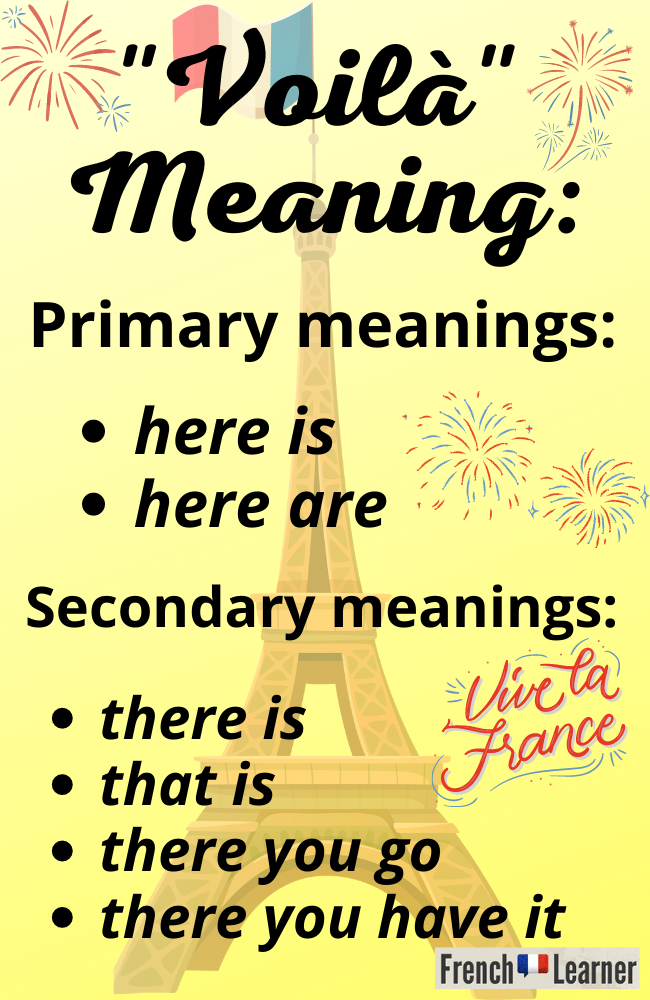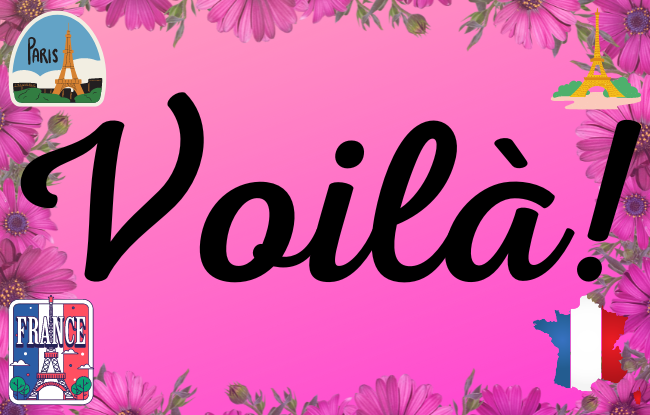Ah, the elusive voilà meaning. French speakers love to use the word voilà in a variety of situations, but it actually has a wide variety of meanings depending on the context. Translated as “here is” or “here are” in most situations, voilà is a very common French word that you’ll definitely appreciate adding to your vocabulary.

What does “voilà” really mean?
Not to be confused with the English word, viola, which is a musical instrument. The word voilà (with its accent grave on the -a) actually can have a variety of meanings depending on how it’s used.
When I first moved to France, voilà was one of the first words I really got down because I heard the French saying it so much. So, this is a great French word to learn whether you’re studying French in school or just going to visit France for a week.
As a tourist, you might hear a French server say voilà after guiding you to your table and pointing to your seats. In this instance voilà translates similarly to, “here you are.”
Since we occasionally use the word voilà like this in English, it should be pretty easy to get the hang of. But, let’s go ahead and dive into some of the other more advanced meanings of voilà and how to use it in a sentence.
Voilà meaning: Voilà in a sentence in French
Like I mentioned earlier, the most common definition of voilà is “here is” or “here are.” But you can also translate voilà into English as: “there is,” “that is,” “this is,” “there you go,” and “there you have it.”
So let’s look a few French sentences together to really examine all of the voilà meanings there are out there.
Voilà votre table. Je vous souhaite un agréable moment.
Here is your table. I hope you have an enjoyable time.
Voilà ses photos d’enfance.
Here are his childhood photos.
Voilà pourquoi on attend maman avant de traverser la rue.
That’s why we wait for mom before crossing the street.
Voilà votre chambre et voilà la salle de bain.
Here is your bedroom and there is the bathroom.

Voilà meaning: Common Voilà phrases
If you’ve been studying French for a little while–or any language at that matter–you’ll know that words can change meanings when they’re put into different phrases. So, I wanted to take you through some of the most common voilà phrases and their meanings.
1. En veux-tu en voilà
Meaning: galore
À Amsterdam se trouvaient des tulipes en veux-tu en voilà.
In Amsterdam were tulips galore.
2. En voilà
Meaning: here you are, here it is, here they are, here is some, here are some
Je sais que tu adores les oeufs le matin donc en voilà.
I know you love eggs in the morning, so here are some.
3. En voilà + [noun]
Meaning: what a + [noun], well that’s a + [noun] for you, well there’s a + [noun] for you (This can be used both sarcastically and non-sarcastically.)
Tu veux aller à la plage aujourd’hui ? En voilà une bonne idée !
You want to go to the beach today? Well there’s a good idea!
4. En voilà assez !
Meaning: That’s enough! That will do!
En voilà assez ! Arrête de parler à ton père comme ça.
That’s enough! Stop talking to your father like that.
5. En voilà des façons ! / En voilà des manières !
Meaning: Mind your manners.
En voilà des façons ! Nous ne mangeons pas debout.
Mind your manners! We don’t eat standing up.
6. En voilà des idées !
Meaning: Well that’s an idea. (This phrase is used sarcastically to mean that the idea is strange.)
Ecouter des chants de Noël en Juillet ? En voilà des idées.
7. Et voilà !
Meaning: There you go. There you have it!
Et voilà ! Votre vélo est réparé.
There you go! Your bike is fixed.
8. Et voilà le travail !
Meaning: And here’s the finished product.
Et voilà le travail ! J’ai fini de construire le lit.
And here’s the finished product! I finished building the bed.
9. Me voilà ! / Nous y voilà !
Meaning: Here I am!/Here we are.
Allô ? Il y a quelqu’un ? Me voilà !
Hello? Is anyone there? I’m here!
10. Me voilà de retour.
Meaning: I’m back.
Me voilà de retour. Et j’ai acheté tout ce que tu voulais au supermarché.
I’m back. I bought everything you wanted from the supermarket.
11Me voilà frais / Me voilà bien
Meaning: I’m in a right mess.
Je suis tombé dans la rivière. Me voilà bien.
I fell into the river. I’m in a right mess.

Conclusion – voilà !
Et voilà ! Now you have it! We hope you now have a much better understanding of the meaning of the versatile word “voilà” and can start to use it some French sentences!

